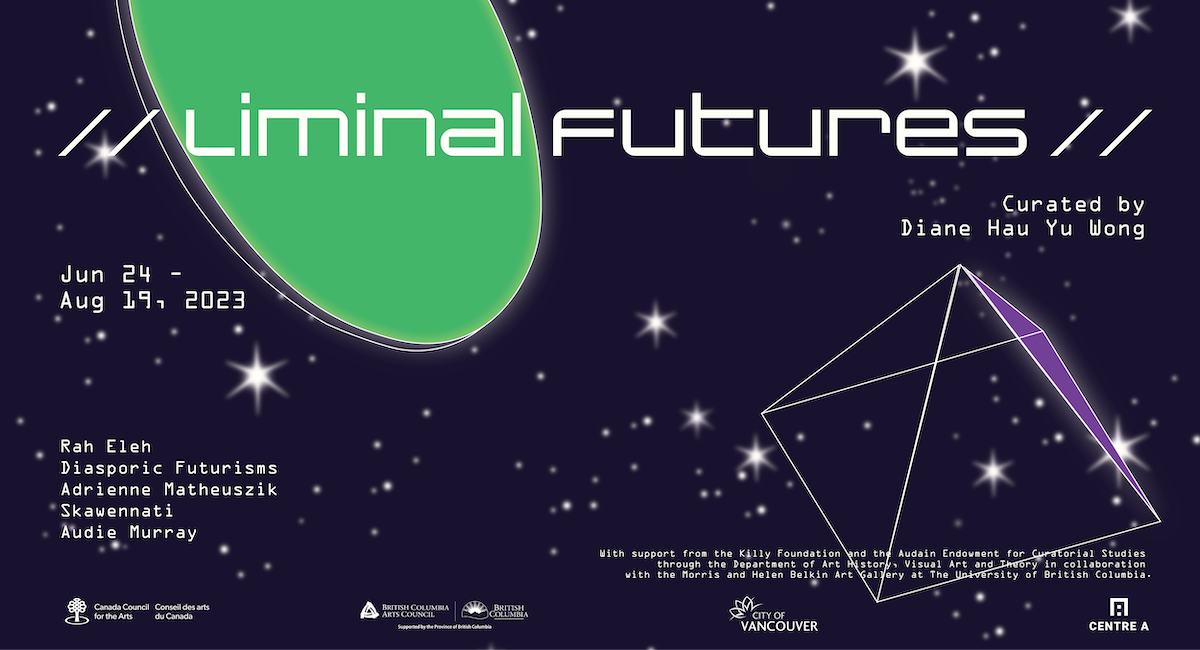

June 24–August 19, 2023
Opening Reception: Saturday, June 24, 5–7PM
Public critique with Dr. Laura U. Marks: Thursday, July 27, 12–2PM
Centre A
268 Keefer St, Unit 205
Wednesday–Saturday, 12–6PM
Curated by Diane Hau Yu Wong
// Liminal Futures // intends to examine the potentiality of liminality as a portal to a better future and include works by Rah Eleh, Diasporic Futurisms (Vanessa Godden and Adrienne Matheuszik), Skawennati, and Audie Murray. In mainstream post-apocalyptic visions of the future, the focus is predominantly on global catastrophes that lead to human extinction. These stories usually explicitly centre figures of whiteness as their protagonists and the survivors of the apocalypse who can save the world. In these narratives, strategies and methods to preserve the future of humanity are more concerned with protecting the future of global structures rooted in a set of social, political, and economic structures derived from Eurocentric systems of imperialism, colonialism, and capitalism. This can be seen in the structural absence of BIPOC bodies in mainstream science fiction, or the tokenization of these characters as a source of difference and otherness within a post-apocalyptic future that stemmed from racial contamination and racial paranoia. At the same time, these stories completely neglect to address the disproportionate effect of the eco-crisis on marginalized communities worldwide.
Instead, // Liminal Futures // centre diverse knowledge and pluralistic forms of agency that undermine the current hegemonic notion of ‘humanity’. In contrast to an apocalyptic future, they embrace nonlinear temporalities and forms of liminality to put forth multiple futures. It can create alternatives to apocalypse visions to open up the possibility for the emergence of a new pluralistic world beyond the apocalypse of colonial domination. The exhibition will address the speculative possibilities of liminal futurisms to create generative solidarities and forms of collective power. It takes into consideration the multiplicity of lived experiences and embraces knowledge from different communities that exist in the world. Post-colonial theorist Homi Bhabha, in particular, has referred to liminality as a transitory, in-between state or space characterized by ambiguity, hybridity, and potential for subversion and change in his 1994 text, “Location of Culture.” Liminality identifies an environment in which cultural transformation can take place, creating sites and opportunities for major societal changes.
At the same time, the exhibition draws on multiple cosmologies that embrace alternative temporalities in which the ‘past’, ‘present’, and ‘future’ are interwoven, where multiple intersections of time exist to imagine the possibilities of a sustainable future for all that embody mutually enhancing relations and collective wisdom. It puts forth alternative methods of examining nonlinear and equitable futures that are parallel to our own, from which we can collapse into our world to encourage steps towards making these futures our reality. The exhibition proposes a set of strategies and knowledge for hybrid beings to embrace radical temporality and liminality beyond the imagination of colonial futures. In doing so, strive away from the imposition of differences amongst marginalized communities to imagine and build collective futures through solidarity and mutually enhancing relationships for future generations.
Diane Hau Yu Wong (She/Her) is a Cantonese-Canadian emerging curator based on the unceded territories of the Musqueam, Tsleil-Waututh and Squamish First Nations. She received her BFA in Art History from Concordia University and is currently an MA Candidate in the Critical Curatorial Studies program at the University of British Columbia. She is also the Programming Manager at Centre A: Vancouver International Centre for Contemporary Asian Art and has curated exhibitions at espace pop, Art Matters Festival, Nuit Blanche, articule, and Centre A. She was the inaugural recipient of the articule x MAI Curatorial Mentorship in 2020/2022 and the 2020 Momus Emerging Critics Residency program.
Her curatorial practice and research are broadly based on the intersection between technology and new media art, predominantly focusing on the world-building possibilities of different iterations of Futurism, such as Afrofuturism, Indigenous Futurism, and Asian Futurism. She is particularly interested in examining the depiction of Asian bodies as cyborgs and non-humans in science fiction through Techno-Orientalism and the current development of Asian Futurism.
With support from the Killy Foundation and the Audain Endowment for Curatorial Studies through the Department of Art History, Visual Art and Theory in collaboration with the Morris and Helen Belkin Art Gallery at The University of British Columbia.
Centre A would like to acknowledge the generous support of Canada Council for the Arts, BC Arts Council, and Vancouver City Council for the realization of this exhibition.

